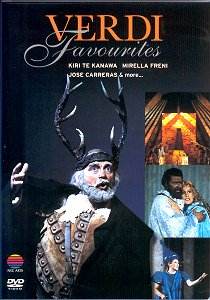|

BUY NOW
AmazonUK
AmazonUS
|
Giuseppe VERDI (1813-1901)
Verdi Favorites
Aida: Gloria all’Egitto, Celeste Aida, Numi Pietà,
Ma tu Re (1871)
Nicola Martinucci (Tenor), Radames
Maria Chiara (Soprano), Aida
Fiorenza Cossotto (Mezzo-Soprano), Amneris
Giuseppe Scandola (Baritone), Amonasro
Giancarlo Sbragia, Director
Anton Guadagno, Conductor
Recorded at the Arena di Verona, July 1981
Ernani: Ernani involami (1844)
Mirella Freni (Soprano), Elvira
Luca Ronconi, Director
Riccardo Muti, Conductor
Recorded at La Scala, Milan, December 1982
Nabucco: Prode guerrier!, Va pensiero (1842)
Ghena Dimitrova (Soprano), Abigaille
Ottavio Garaventa (Tenor), Ismaele
Bruna Baglioni (Mezzo-Soprano), Fenena
Renzo Giacchieri, Director
Maurizio Arena, Conductor
Recorded at the Arena di Verona, August 1981
I Lombardi: La mia letizia infondere, Risorgimento
(1843)
Jose Carreras (Tenor), Oronte
Gabriele Lavia, Director
Gianandrea Gavazzeni, Conductor
Recorded at La Scala, Milan, April 1984
Otello: Credo in un Dio crudel, Si pel ciel, Ave Maria
(1887)
Piero Cappuccilli (Baritone), Iago
Vladimir Atlantov (Tenor), Otello
Kiri te Kanawa (Soprano), Desdemona
Gianfranco de Bosio, Director
Zoltan Pesko, Conductor
Recorded at Arena di Verona, July 1982
Falstaff: Udrai quanta egli sfoggia, Tutto nel mondo
(1893)
 John Dobson (Tenor),
Dr. Caius John Dobson (Tenor),
Dr. Caius
William Wildermann (Tenor), Pistol
Francis Egerton (Bass), Bardolph
Dalmacio Gonzales (Tenor), Fenton
Brenda Boozer (Mezzo-Soprano), Meg Page
Barbara Hendricks (Soprano), Nannetta
Lucia Valentini-Terrani (Mezzo-Soprano), Mistress Quickly
Leo Nucci (Baritone), Ford
Renato Bruson (Baritone), Falstaff
Ronald Eyre, Director
Carlo Maria Giulini, Conductor
Recorded at the Royal Opera House, Covent Garden, July 1982
 NVC ARTS WARNER MUSIC
VISION DVD 50467 4773-2 NVC ARTS WARNER MUSIC
VISION DVD 50467 4773-2  [57:43]
[57:43]
|
Error processing SSI file
|

